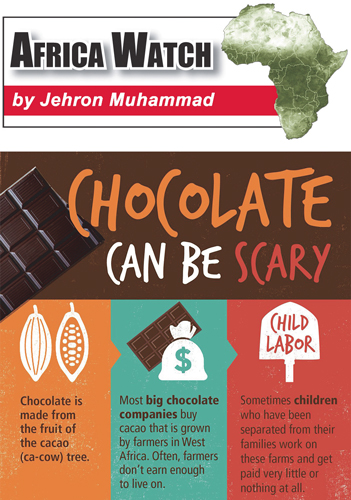Africa’s cocoa farmers average $1 a day in a $100 billion global chocolate industry
By Jehron Muhammad | Last updated: Aug 24, 2018 - 10:56:14 AMWhat's your opinion on this article?
Cadbury is calling on its “fans” to design its next chocolate bar. The London-based “chocolatier,” in its marketing scheme, is calling on customers to choose from over 90,000 flavor combinations online, where they can invent, design and name the chocolate bar of their dreams.

|
What is surprising about this nearly $20 billion chocolate business— owned by Mondelez International, formerly known as Kraft Foods—is how little involvement Ghana and Ivory Coast, the source of 70 percent of the world’s cocoa, have had in the nearly 200 years of Cadburys’ and, for that matter, the entire chocolate industry’s existence.
Between 1961, when data was made available, to 2016, Africa’s share of total chocolate exports inched up by a paltry 0.9 percent.
And, check this out, in 2012, during the second World Cocoa Conference in Amsterdam, one finding was that the $100 billion U.S. confectionary industry paid roughly $6 billion to farmers. It gets worse. Contrast that with the $15 billion paid out to governments as Value Added Taxes (VAT). So, in an industry that generates annually nearly $100 billion, more money goes toward paying taxes on cocoa and chocolate than to the farmers responsible for sustaining the crop.
To make it worst, according to foodtank.com, a think tank for food, “nearly 90 percent of cocoa is grown by subsistence farmers working on modest plots of land, the majority of whom live in West Africa.”
A recent report from Fair-trade International found that these farmers earn less than $1 a day. Senior advisor Carla Veldhuyzen van Zante added, “more than half of cocoa households live below the extreme poverty line.”
According to the AfricaFocus, “The global value chain from cocoa to the chocolate bars sold around the world and consumed in largest quantities in rich countries features the same inequality today as it has since the industrial expansion of the chocolate industry in the late 19th century.” Cocoa’s harvesting is mainly centered in West Africa while production of chocolate is concentrated in Western Europe.
“Cocoa has been driving 30 percent of overall deforestation in Ivory Coast and Ghana, and destroying other forests from Asia to the Amazon,” declared Etelle Higonnet of mightyearth.org.
Sergi Corbalán of the Fair Trade Advocacy Office added that cocoa must be good for people as well as the planet: “Child labour is a consequence of poverty. Better prices must be paid to cocoa farmers to enable them to secure a living income.”
Core challenges require legislation in both producing and consuming countries. “The EU (European Union) must rise to the challenge, as Europe is the number one importer, manufacturer, and consumer of chocolate worldwide—and home to the biggest chocolate companies,” explained Julia Christian of Fern, the environmental and social justice organization that focuses on forests and forest peoples’ social rights.
During a recent EU parliamentary hearing in Brussels, focusing on cocoa, deforestation, and child labor participants acknowledged the EU as the world’s number one importer, manufacturer, and consumer of cocoa has a tremendous responsibility for the problems of this industry and the commodity it produces.
During the hearing, one Member of the European Parliament after another voiced concern that “voluntary” industry action on cocoa is not enough.
The migthyearth.org reported, “NGOs speaking … made a unified call for a mandatory due diligence law. Representatives of the largest chocolate manufacturers, who attended the hearing, agreed that a law would be welcome; and the government of Ghana representative also suggested an EU law could be desirable. Linda McAvan, who hosted the event, closed by summing up that there was a ‘near-consensus’ in the room that EU regulation is needed. Moreover, the hearing brought up criticism of EU trade agreements with Ghana and Ivory Coast, highlighting the need for such trade agreements to include better protections against deforestation and child labor.”
A statement from non-governmental organizations said: “Just two months ago in the final declaration of the forth World Cocoa Conference held in Berlin, the cocoa sector itself recognized that ‘voluntary compliance has not led to sufficient impact,’ and that ‘all stakeholders are called upon to strengthen human rights due diligence across the supply chain, including through potential regulatory measures by governments.’ ” Whether the above verbal measures will bring about anything of substance is anyone’s guess.
Ghanaians have already begun to take things into their own hands and manufacture their own chocolate. The product is called Divine Chocolate and is co-owned by the 85,000 farmer members of Kuala Kokoo, a cooperative in Ghana that supplies the cocoa for each bar of Divine Chocolate. As owners, they get a share of the profits, a say in the company, and a voice in the global marketplace.
“Thanks for supporting Divine Chocolate’s efforts to make the world a place where chocolate is cherished by everyone, including the family farmers who grow the cocoa,” the farmers said.
Follow @jehronmuhammad on Twitter.
INSIDE STORIES AND REVIEWS
-
-
About Harriett ... and the Negro Hollywood Road Show
By Rabiah Muhammad, Guest Columnist » Full Story -
Skepticism greets Jay-Z, NFL talk of inspiring change
By Bryan 18X Crawford and Richard B. Muhammad The Final Call Newspaper @TheFinalCall » Full Story -
The painful problem of Black girls and suicide
By Charlene Muhammad -National Correspondent- » Full Story -
Exploitation of Innocence - Report: Perceptions, policies hurting Black girls
By Charlene Muhammad -National Correspondent- » Full Story -
Big Ballin: Big ideas fuel a father’s Big Baller Brand and brash business sense
By Bryan Crawford -Contributing Writer- » Full Story






 Click Here Stay Connected!
Click Here Stay Connected!








